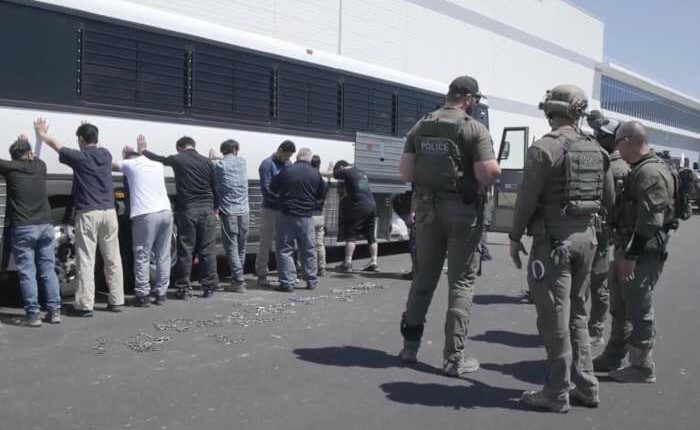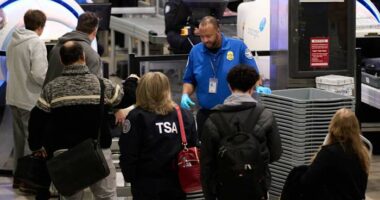Share this @internewscast.com

SAVANNAH, Ga. – Following an immigration raid two months ago at Hyundai’s electric vehicle manufacturing site in Georgia, where 300 South Korean nationals were detained, some of these workers have made their way back to the U.S. to continue their employment, their company announced on Thursday.
In September, operations came to a halt at a battery plant under construction at the expansive site near Savannah, where Hyundai Motor Group began manufacturing electric vehicles last year. The raid led to the detention of 475 workers, the majority being South Korean nationals. According to U.S. immigration authorities, these individuals had overstayed their visas or entered the country under visa waivers that did not permit employment.
HL-GA Battery Co., the company operating the battery plant, issued a statement Thursday confirming that construction has resumed with a combination of new and returning workers. They expressed gratitude towards the U.S. and South Korean governments, alongside Georgia officials, for their efforts in ensuring a “smooth and timely return.”
The company’s statement also highlighted their commitment to begin production in the first half of the upcoming year and their ongoing efforts to recruit local staff to operate the facility.
Mary Beth Kennedy, a spokesperson for HL-GA Battery, informed The Associated Press that some returning workers were among those detained in September, although she did not specify the exact number.
On September 4, over 300 South Korean workers were detained during the immigration raid at the vast Hyundai Motor Group site near Savannah, where electric vehicles are produced. The workers were held at a Georgia detention center for a week before being released and transported back to South Korea, following negotiations by the South Korean government.
The roundup by U.S. Immigration and Customs Enforcement, which released video showing some of the detained workers shackled in chains, sparked outrage and feelings of betrayal in South Korea, a key U.S. ally that has pledged hundreds of billions of dollars in American investments.
The Georgia raid targeted one of the state’s largest and most high-profile manufacturing sites, where Hyundai produces electric vehicles at a $7.6 billion plant. The 475 people detained all worked at the battery plant, which will produce batteries to power Hyundai EVs. It is operated by HL-GA Battery, a joint venture by Hyundai and LG Energy Solution.
The South Korean nationals detained in Georgia were largely engineers and other highly skilled workers who came to the U.S. temporarily to install equipment and perform other specialized work to get the battery plant up and running.
It is unclear how many of the formerly detained workers are coming back. Jongwon Lee, an attorney in metro Atlanta, said he has firsthand knowledge of two Korean nationals who plan to return after the U.S. State Department confirmed that their B-1 business visitor visas were still valid.
But Kihwan Kim, president of the Federation of Korean Associations for the Southeast U.S., said some of the workers snared in the raid are hesitant to return to the U.S.
“They don’t have to come to the United States to work after that kind of humiliation,” Kim said. “They can go to other countries.”
South Korea’s government demanded improvements to the U.S. visa system for skilled Korean workers. Last month, the South Korean Foreign Ministry announced that U.S. officials had agreed to allow South Korean workers on short-term visas or a visa waiver program to help build industrial sites in America
U.S. President Donald Trump initially defended the immigration raid in Georgia, saying in September that the detained workers “were here illegally, ” When asked about those workers again during an October visit to Seoul, Trump said: “I was opposed to getting them out.”
Copyright 2025 The Associated Press. All rights reserved. This material may not be published, broadcast, rewritten or redistributed without permission.














